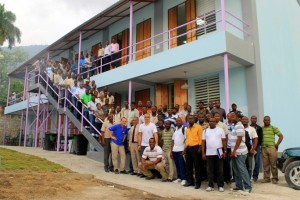 A new building on the Quisqueya University (UniQ) campus in Port-au-Prince, Haiti, provides some of the most powerful evidence yet that Haiti’s engineering community, with international assistance from the University at Buffalo’s Multidisciplinary Center for Earthquake Engineering Research (MCEER), is undergoing a dramatic transformation.
A new building on the Quisqueya University (UniQ) campus in Port-au-Prince, Haiti, provides some of the most powerful evidence yet that Haiti’s engineering community, with international assistance from the University at Buffalo’s Multidisciplinary Center for Earthquake Engineering Research (MCEER), is undergoing a dramatic transformation.
The building is the first on the campus to be built according to seismic design principles, a direct result of the building’s architect and engineer attending earthquake engineering seminars held by UB and UniQ that began shortly after a devastating earthquake struck the island on Jan. 12, 2010. They are among the more than 500 engineers — estimated to be half of all working engineers in the Haitian capital — who are the first in their profession to have received this training.
Prior to the completion of the building, classes had been held in a large tent, where temperatures often exceeded 100 degrees Fahrenheit.
The building reflects the dawn of a new reality in Haiti, where there had been no building codes and no legal requirements to prepare plans and submit them for approval by a government-run building department.
That began to change just eight days after the 2010 quake, when Filiatrault and UB’s MCEER assembled and deployed the first team of French-speaking structural engineers to Haiti to conduct building safety inspections at the request of the United Nations. MCEER and UniQ then began reaching out to Haitian engineers, with the first seminar held in May 2010, followed by three more held since then, including the most recent held in August.
The goal of the MCEER-UniQ partnership and seminars is to help Haiti establish its own community of earthquake engineers. With an estimated 1,000 practicing engineers in Port-au-Prince, MCEER has trained 560 participants, more than 50 percent of that city’s engineering population, in methods of earthquake-resistant design. In addition, 58 engineers from Haiti’s Ministry of Public Works, Transport and Communications have participated in the seminars; their presence will help ensure informed government oversight of the rebuilding process ahead.


I remembered that disastrous incident, good to know that people in Haiti are strong enough to start again.
That is a good start.
That's absolutely great news, we are glad knowing that Haiti is starting to stand after the disastrous earthquake happened.